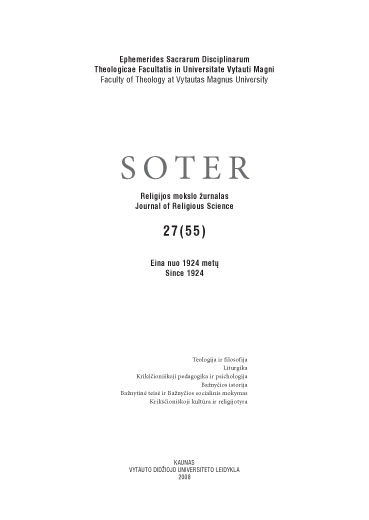Marijos kulto problematika Europos krikščioniškoje erdvėje
THE PROBLEMS OF DEVOTION TO THE VIRGIN MARY IN CHRISTIAN EUROP
Author(s): Rimas SkinkaitisSubject(s): Christian Theology and Religion
Published by: Vytauto Didžiojo Universitetas
Keywords: Marija; mariologija; kultas; Bažnyčia,
Summary/Abstract: The article discusses the main tendencies in the Mariological cult in Western Europe nowadays. Two trends are distinguished: secular and Christian. From the point of view of the secularized trend of the Mariological cult three more important interpretations can be defined: - mystical interpretation which treats the Mariological cult as a true cultural phenomenon that comes from the pagan mythology and remains in the modern world dressed in Christian clothing. In other words, it is the old paganism wearing new Christian clothes; - psychological interpretation which treats the cult of Mary not as a religious but as a psychological phenomenon which is the result of a human’s psychological processes, and which might perform a positive role in the psychotherapy; - social interpretation takes the phenomenon as a reliable ideological instrument used by the Church for making an impact on the society. Here the two radical points of view - Marxist and feminist - concerning the issue should be mentioned. Christian theology interprets the phenomenon exceptionally on the background of revelation and faith. True, different confessions have their own conception of Mary and her cult. The initiator of the Reformation M. Luther had written a great number of homilies, letters and texts in which the Mother of god is accepted very warmly and lovingly and with the utmost respect. Luther acknowledges the distinction of Mary as Mother of god and recognizes god’s attention shown to her. However the initiator of the Reformation rejects the tendency of the time to make Mary almost equal to Jesus Christ, though he accepts her as the mediator and patroness as well as Christ’s follower. Thus according to Luther and today’s Protestant tradition, Mary is an example and even a model of devotion, service and faithfulness to God. A lot of Reformers, including U. Zwingli and J. Calvin keep the same approach to the question. They express their whole-hearted respect to Mary, but speaking about her from the theological point of view, they rely only on the facts found in the Holy Scriptures. Thus, the reason why they reject the cults as well as liturgical rites concerning Mary’s glorification becomes evident. Moreover, the attention and respect paid to the Virgin Mary are much more often found in the theological approach to the matter. The position of the Church of England (Anglican Church) is not sufficiently clear. The traces of old traditions and Protestantism are closely interwoven: there one may find obvious instances of attention and respect to Mary, and also relatively similar doctrines as well as theological problems and principles - on the one hand, and on the other hand - the influence of Protestantism on the Mariological cult is fairly obvious. The Catholic Church presents its dynamic and varying position as far as the Mariological cult is concerned. Until Vatican Council II Mariology was separated from other theological disciplines, and the personality of Mary was d
Journal: SOTER: religijos mokslo žurnalas
- Issue Year: 55/2008
- Issue No: 27
- Page Range: 81-91
- Page Count: 11
- Language: Lithuanian

